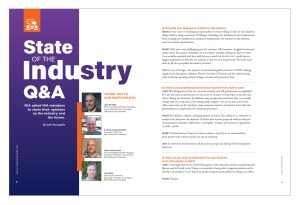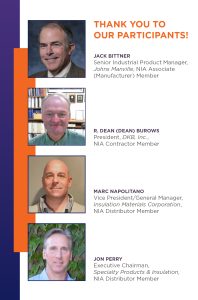The State of the Industry Q&A
NIA asked NIA members to share their opinions on the industry and the future.
Q: Describe your impression of 2022 for the industry.
Dean: It was a year of challenging opportunities for firms willing to take on risk related to design build or design assistance. Challenges including over-burdensome bid requirements from bonding, pre-qualifications, insurance requirements not standard to the industry, and non-existent specifications.
MARC: 2022 was a very challenging year for everyone. All businesses struggled to hire and retain talent. The impact of inflation on our industry was like nothing we had ever seen. I was actually surprised with how well the year turned out for all of us. I would say my
biggest impression of 2022 for our industry is that we are a tough bunch. The hard work done by all of us propelled the industry forward.
JON: A year of change—the impacts of national and global concerns: COVID relaxing, supply chain disruptions, inflation, Russia’s invasion of Ukraine and the related energy crisis in Europe, growing climate change concerns, and protests in Iran.
Q: What is your greatest business lesson learned from 2020 to now?
JACK: We all figured out that we can work remotely and still get business accomplished.
It is not the same as meeting face-to-face, but we all made it work when it was the only choice during the lockdown. In addition, many people discovered that they can actually change jobs and companies, and nothing really changes—you are in your same home
office, same view out the windows, same computer, monitor, and printer. I fear that this phenomenon has implications for retaining personnel.
Dean: The ability to adapt to changing human resources. The ability for a contractor to analyze risk, determine the objective of clients who request proposals without adequate documentation, and then sufficiently—and legally—prepare and execute an agreement
to make a profit.
MARC: Greatest lesson I learned is, there is always a way. If you are surrounded by good people with common goals, you can do anything.
JON: It reinforced that business is all about your people and having the best employees and team.
Q: What are you most excited about for your business or for the industry in 2023?
JACK: I am happy that we can travel freely again to visit customers, vendors, and jobsites just like we used to be able to do. Doing so is essential to being able to improve products and to develop new products. I can’t dream up product improvements while I’m sitting in an office.
Dean: Change.
MARC: I am most excited to see what capital projects come back to life in 2023. We have already seen a large surge in demand, and I am hopeful it will continue with more industrial and commercial projects in 2023–2024.
Q: What is your prediction for 2023?
Dean: The change will continue.
MARC: In 2023, I expect a good year for our industry on all levels. The demand has been very strong in this first quarter, and I expect it to continue. I predict we will, unfortunately, still be in a “people deficit.” Companies will need to be creative to attract top talent.
JON: I believe 2023 will be varied based upon each market—residential, commercial, and industrial—with even more variations of performance in each of these end markets.
Q: Do you expect a recession in 2023?
JACK: I honestly think we are already in a recession, but the government has been changing the definition to avoid having to say the word.
Dean: I think we are in one already, unlike anything we have experienced.
MARC: I do not. This will be a strong year.
JON: The economist we partner with, ITR Economics, is predicting a mild recession in 2024.
Q: How has your management style varied from pre-pandemic to post-pandemic?
Dean: The pandemic altered human resources, and leadership soft skills have changed. Management has had to change to meet the unstable human resources coming out of the pandemic. Focusing on more diverse human resources will be the key to success in the future if Congress does not change its immigration laws, maybe allowing for visas for
construction workers.
MARC: The biggest change in my management style is I am ultra-focused on keeping the team spirit alive. The IMC [Insulation Materials Corporation] team weathered the pandemic shoulder to shoulder, under very unorthodox and difficult conditions. The team worked together to be sure our co-workers were safe and our essential business was able to perform and thrive. It all worked because we did it together.
Q: How important is continuous industry education and keeping your employees aware of issues impacting the industry?
Dean: Given that employers today are filling positions with non-traditional employees, the only way to accomplish a safe, productive, and quality project is through continuous education tailored to meet the needs of each employee and employer.
MARC: The key to keeping employees engaged in the business is to support their continued education and find innovative ways to inform them of developments in the industry and our company.
Q: What are your thoughts on the new NIA Education Center?
Dean: NIA’s Education Center is the most exciting change in our association in decades. It is exciting to have a single source site to assist NIA members with continuous education. Our ability to train quality professionals from within our company for the future is invaluable to the industry and our association’s longevity.
MARC: The new NIA Education Center is incredibly user friendly and inviting. It gives us so many options to further our industry knowledge.
Q: How do you differentiate your company from others, and how do you encourage the top performers to join your company and stay with you?
Dean: At DKB, Inc., we differentiate our company with our integrity, code of conduct, and values.
MARC: Insulation Materials Corporation is a hands-on company from the top down. Our employees are service focused and true customer advocates. I believe people are attracted to IMC because they see the value of our corporate culture and want to be a part of it.


